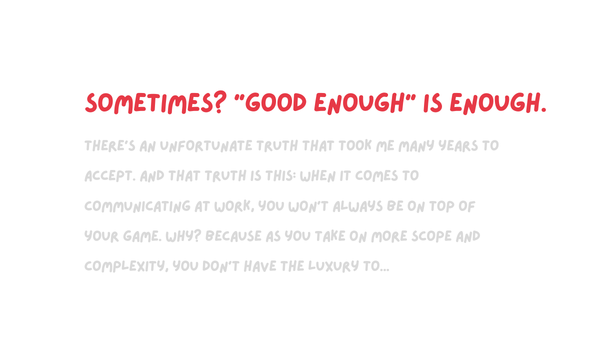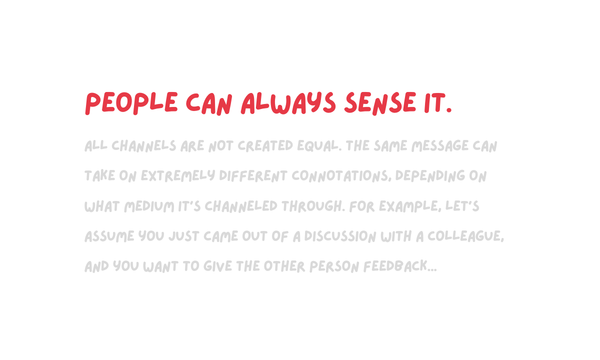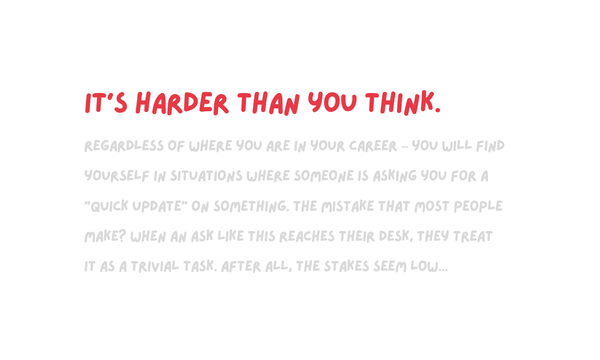Simply Interviewing for Roles at Google Won't Work for Me Anymore

I’ve switched roles a couple times at Google.
The process was always pretty simple. Someone would tell me about an opening on their team, suggest that I’d be a good fit, and encourage me to apply.
I would then apply, interview, receive an offer, and take it.
Now, looking ahead: I don’t know when exactly I’ll switch roles again.
But for anyone looking to make an internal move soon: here are some of my learnings and reflections.
1️⃣ Intentionality is key.
Gone are the days where you simply wait for an opportunity to open up or even knock at your door.
Instead, as the years go on, you start competing more and more with extremely qualified people who also have great track records within the company.
In fact, sometimes the list of frontrunners is decided already before a role even opens up. By the time a role opens up, sometimes the process is half done already.
(Except they’ll never tell you that!)
What this means is that the tried-and-true formula of (a) doing your job well (b) maintaining a good reputation (c) knocking your interviews out of the park… doesn’t work anymore.
You need to start thinking about d, e, f, and more.
For instance, have you thought about:
- Who are the decision-makers for teams/roles you’re interested in? If they don’t know who you are, can you create opportunities to cross paths with them and demonstrate your value?
- Who are the people that you do work with that will go to bat for you? How can you leverage their influence in the organization and add them to your list of champions?
There was a period of time where I was exploring new roles, and thus started seeking advice from senior leaders who I had worked for.
As I went to them for advice, a couple of them actually also offered to sponsor me — completely unprompted.
Needless to say, I was extremely grateful. Especially because I was someone who had never been comfortable asking for favors or anything resembling endorsement.
But ironically, this made me realize how unintentional I was.
You see, I had worked hard in my role out of a sense of passion, and luckily that was recognized by leadership within my org. But I was not intentional about it; it was just a lucky byproduct.
There’s no use mulling over what if’s, but my learning is this:
2️⃣ Take some risks, and be creative.
All along we have been told that networking helps.
To a certain extent this is true: some good things can come out of networking.
But networking only gets you so far. At the end of the day, if the people that matter haven’t seen your work (or heard about it from other people that matter), no amount of networking can supersede that.
Simply showing up once a quarter in front of some VP and telling them how great you are and how interested you are in their team will not get you very far.
For instance, I have had colleagues who were interested in becoming Product Managers, but had no technical-related experience, as they were coming from business strategy teams. No amount of networking or leadership endorsement could realistically break down that barrier.
So they decided to seek out 3-to-6-month rotational opportunities with Product teams. There was no promise to convert them into full-time headcount with the team, but at least they could now demonstrate their capabilities to the people who mattered.
And once headcount did start opening up on certain teams, they were in much better shape to become frontrunner candidates, as they now had credible endorsement, and had tangible deliverables to show for it.
No one told them to pursue this path, and no one guaranteed it would necessarily work out. But they took a chance, put in the work, dealt with the uncertainty, and eventually landed the role of their dreams.
There are other creative approaches too.
For instance, I know people who are involved in community-building activities in the company, which often entail executive sponsors. Again, this becomes another sneaky (but fully legitimate) way for you to build genuine connections with senior people that matter, and for you to start building your profile in front of them.
For instance, for almost any activity that requires planning and discussion, you can demonstrate things like soft leadership, gravitas, project management skills, decision-making principles, communication skills…the list goes on.
Don’t underestimate how these things can add up and open doors for you somewhere down the line. They will never be enough, of course – but if you continue to build up small tailwinds for yourself over time, it might just push you over the line some day.
Again, these things are not written down in any playbook, and they might not even work for everybody. But sometimes they do. And you have to find the path that works for you.
3️⃣ Bake in enough lead time. And then some more.
If you’re thinking about switching roles 6 to 12 months from now, you need to start taking action today.
Learning about what’s out there takes time. Connecting with people that matter takes time. Finding people who know people that matter AND that are willing to make introductions for you takes time.
The thing is, even if you do all of that, you will have still barely scratched the surface.
Due diligence and networking are tablestakes. As we talked about earlier, if you’re hoping to move to a team where people don’t know you (or even know of you), you need to invest time and effort to properly differentiate yourself, and showcase what you can bring to the table.
The last thing here is that even if you do all the above, the right role might not even pop up.
Sometimes you just have to wait, wait, and wait.
But if you’ve been intentional, creative, and prepared: that can sometimes make all the difference.


